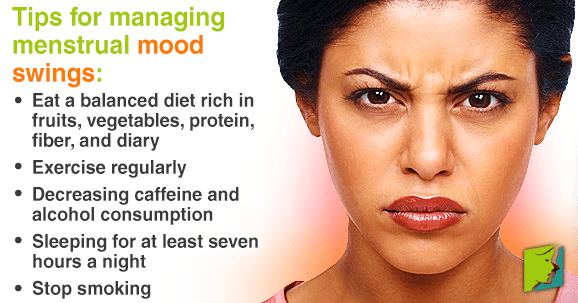Around three-quarters of women experience premenstrual syndrome (PMS) in the days leading up to their monthly period. Physical symptoms of PMS include body aches and pains, fatigue, bloating, breast tenderness, and acne. Emotional and psychological symptoms include anxiety, sadness, being more prone to crying, mood swings, irritability, anger, trouble sleeping, appetite changes, and feeling less social.
If the emotional and psychological symptoms of PMS are severe enough, they are classified as premenstrual dysphoric disorder (PDD). PDD can include severe depression symptoms, anxiety, tension, and irritability. These are often interpreted as "mood swings".
What Causes Menstrual Mood Swings?
The cause of mood swings during PMS and PDD is not well understood. However, cyclical changes in hormones, such as estrogen and progesterone, are probably at least partially responsible. Chemical changes in the brain, such as fluctuations in serotonin, may also causes these conditions. Women who have a history of anxiety and depression are also more likely to suffer from PMS, PDD, and mood swings.
Lessening Menstrual Mood Swings
It is often not possible to completely get rid of menstrual mood swings. However, there are steps you can take to lessen them and control them. One of the most effective ways to manage menstrual mood swings is to maintain a healthy lifestyle. Ensuring that your body is healthy and is receiving the necessary nutrients to function properly will help alleviate mood swings and increase overall well-being. A healthy lifestyle includes:
- Eating a balanced diet rich in fruits, vegetables, protein, fiber, and dairy
- Exercising regularly
- Decreasing caffeine and alcohol consumption
- Sleeping for at least seven hours a night
- Ceasing use of tobacco products
Even so, some menstrual mood swings are severe enough that additional treatment is needed. Woman should consult their doctor, who may prescribe or recommend treatments such as:
- Antidepressants
- Hormone patches or oral progesterone
- Combined contraceptive pill
- Hormone replacement therapy (for menopausal women)
- Cognitive behavioral therapy
Managing Mood Swings
Actively trying to take control of your mood can be helpful. When you are feeling agitated, depressed, or angry, try to pinpoint what is making you feel that way. If it is something small or trivial that does not deserve to negatively impact your mood, try to let go of those negative feelings.
Lifestyle changes, medicine, and therapy can help to treat mood swings that are connected to menstruation. Most women are never able to completely eradicate menstrual mood swings, but they can be lessened and controlled.
Sources
- Gallenberg, M.M. (2012). What's the difference between premenstrual dysphoric disorder and premenstrual syndrome? Retrieved September 29, 2015, from http://www.mayoclinic.org/diseases-conditions/premenstrual-syndrome/expert-answers/pmdd/faq-20058315
- Mayo Clinic Staff. (2014). Premenstrual syndrome (PMS). Retrieved September 29, 2015, from http://www.mayoclinic.org/diseases-conditions/premenstrual-syndrome/basics/causes/con-20020003
- National Institute of Health. (2014). Premenstrual dysphoric disorder. Retrieved September 29, 2015, from https://www.nlm.nih.gov/medlineplus/ency/article/007193.htm




